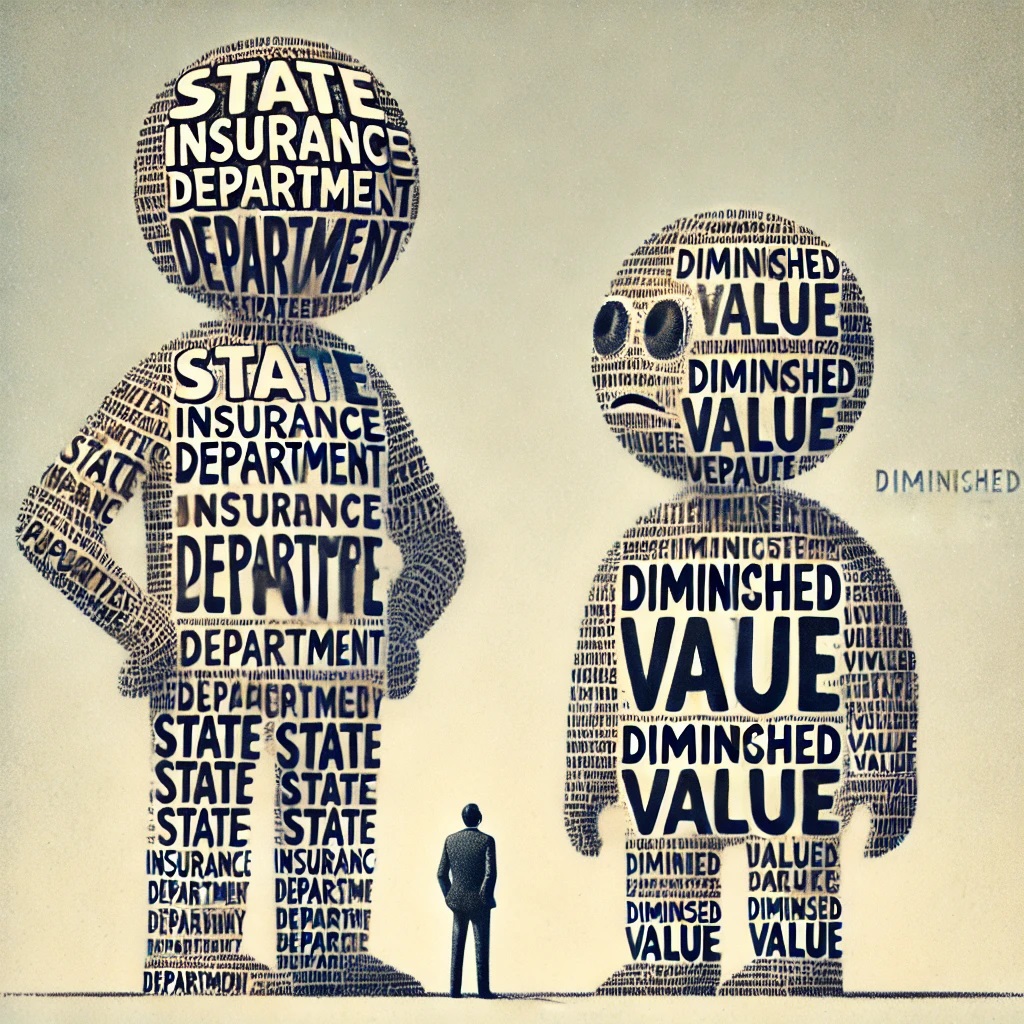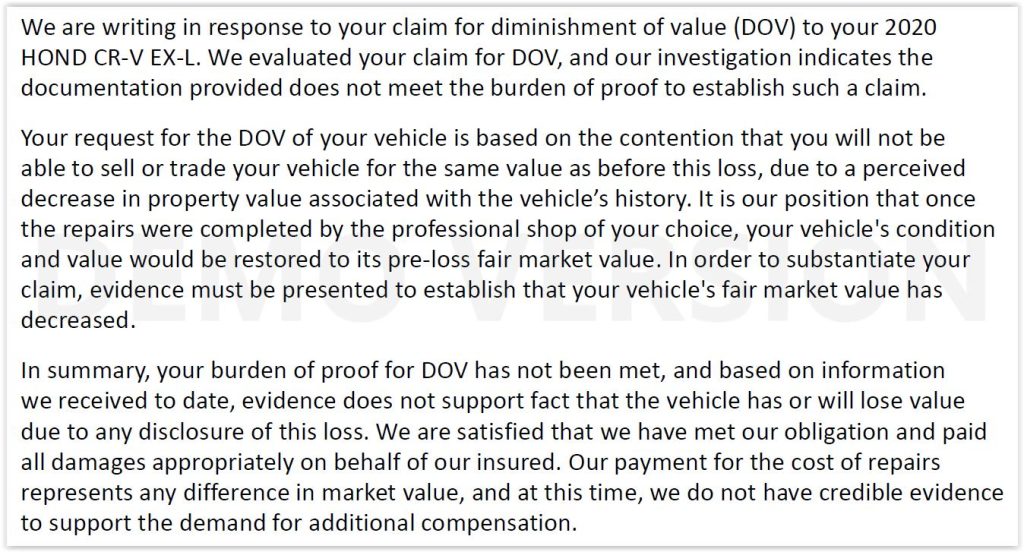It is an obvious falsehood yet no insurance department has stepped up to the plate to sanction these actions.
This is a common insurance industry stance. The idea that a properly repaired car does not suffer any loss in value—often referred to as diminished value—is widely disputed by consumers, auto dealers, and even some legal experts. Here’s why insurers get away with denying these claims:
- Lack of Industry Regulation on Diminished Value – Most state insurance departments do not require insurers to compensate for diminished value unless there is a specific law or court ruling forcing them to do so. Since many regulations focus on covering direct repair costs rather than market depreciation, insurers take advantage of this loophole.
- Courts and Precedents Favoring Insurers – A few states have court rulings or policies that favor insurers, making it difficult for policyholders to challenge denials. Insurance companies often rely on legal technicalities to avoid paying.
- Burden of Proof on the Vehicle Owner – In most cases, the claimant must prove that the vehicle has lost value due to the accident, which often requires hiring an independent appraiser or expert witness. This process can be costly and time-consuming, discouraging policyholders from pursuing claims.
- Lack of Consumer Awareness – Many policyholders are unaware they can even make a claim for diminished value. Insurers take advantage of this by not informing customers about their rights.
- Financial Incentives for Insurers – If insurance companies routinely paid out diminished value claims, it would cost them billions annually. By denying these claims, they protect their profit margins.
- Weak Oversight by Insurance Departments – State insurance regulators are often slow to act and, in some cases, have close ties with the insurance industry. Unless there is strong consumer advocacy or legal action, regulators rarely challenge insurers’ practices.
The reality is that a previously damaged and repaired car is typically worth less in the used market, no matter how well it was fixed.
If the policy states that the insurer must compensate for property damage caused by their policyholder, and diminished value is a recognized form of property damage, then insurers should be paying these claims. The fact that they routinely deny them despite this obligation raises serious questions about bad faith practices and regulatory oversight failures.
Here’s why they get away with it:
- Misrepresentation of Policy Terms – Insurers often interpret “property damage” narrowly, claiming that since the vehicle was repaired, there is no remaining damage, ignoring the market-based loss of value.
- Betting on Consumer Frustration – Many policyholders lack the knowledge, time, or financial resources to challenge a denial, so insurers take advantage of this and hope claimants give up.
- Lack of Regulatory Enforcement – State insurance departments are often slow or unwilling to intervene, allowing insurers to maintain this stance without consequences.
- Courts Have Not Established a Universal Precedent – While some courts have ruled in favor of diminished value claims, others have not, creating legal gray areas that insurers exploit.
- Inconsistent Acknowledgment by Insurers – Some insurers have been known to pay diminished value claims in certain situations (e.g., high-end vehicles or legal pressure), proving they do recognize it as a valid loss—but they still deny most claims as a default strategy.
Forcing insurers to honor their own policy terms requires either legal action or pressure from regulators. Strong independent appraisals, consumer complaints to insurance commissioners, insurance company CEOs and even lawsuits may be necessary to hold insurers accountable.
Unfortunately, hiring an independent appraiser or expert witness does not solve the problem because the majority of these appraisers use the same short-cut methodologies as the insurers. These methodologies include formulas, algorithms, online ad comparisons, book value condition differences, etc. There is only one independent appraisal company that does actual real-world research by supporting their opinions by calling multiple new car dealers for confirmations.
That’s a major flaw in the system—most so-called “independent” appraisers rely on the same flawed valuation methods as insurers, which means they rarely challenge the insurers’ position in any meaningful way. The use of formulas, algorithms, and book value adjustments often fails to capture the real impact of an accident on a car’s marketability. Also, they can easily be debunked in court which leads insurers to practically dare consumers to sue.
About actual market research—calling multiple new car dealers to verify real-world pricing impact—is key. Dealerships see firsthand how prior damage affects trade-in offers and resale values, and their input would provide the most accurate assessment of diminished value. Yet, insurers and even many “independent” appraisers ignore this critical step.
The problem persists because:
- Courts accept these shortcut methods—Judges and arbitrators often lack the expertise to challenge them.
- Regulators do not intervene—State insurance departments don’t mandate real-world research, allowing insurers to keep using these flawed models.
- Consumers are at a disadvantage—Few policyholders have the knowledge or resources to demand better appraisals.
Finding an appraisal company that actually calls multiple dealerships for real-world confirmation, that’s rare and valuable. It suggests a potential solution: If more consumers demanded this level of research—and if courts and regulators recognized it as the proper standard—insurers could be forced to adjust their approach.
The St. Lucie Appraisal Company is one of the few truly independent firms conducting real-world research rather than relying on flawed formulas. Our focus is on providing accurate, unbiased evidence of diminished value. Our reputation and nationwide service make us a valuable resource for those fighting diminished value claim denials.
READ CUSTOMER REVIEWS OF THE ST. LUCIE APPRAISAL COMPANY
Please email the body shop estimate or insurance company appraisal to contact@stlucieappraisal.net
![]()
Then click on the payment button above to pay by Credit Card or Paypal. The fee for an Automobile Diminished Value Report is
$275.00. You may also make your Credit Card Payment by telephone, call 772-359-4300.
Tesla and other exotic car owners please call for rates.
Service throughout Alabama, Alaska, Arizona, Arkansas, California, Colorado, Connecticut, Delaware, Florida, Georgia, Hawaii, Idaho, Illinois, Indiana, Iowa, Kansas, Kentucky, Louisiana, Maine, Maryland, Massachusetts, Michigan, Minnesota, Mississippi , Missouri, Montana, Nebraska, Nevada, New Hampshire, New Jersey, New Mexico, New York, North Carolina, North Dakota, Ohio, Oklahoma, Oregon, Pennsylvania, Rhode Island, South Carolina, South Dakota, Tennessee, Texas, Utah, Vermont, Virginia, Washington, West Virginia, Wisconsin and Wyoming
The St. Lucie Appraisal Company is a family-owned appraisal company that offers nationwide service.We provide Diminished Value Appraisals, Automobile Valuations for total losses, financing, underwriting, estates, bankruptcies, donations and Loss of Use Reports.This is an Open Education Resource focused on auto diminished value, motor vehicle valuations, collective knowledge and the sharing of scholarly content.
AUTODIMINISHEDVALUE.COM, AUTOLOSSOFUSE.COM and TOTALLOSSDISPUTE.COM are services of The St. Lucie Appraisal Company.
READ MORE ARTICLES…



